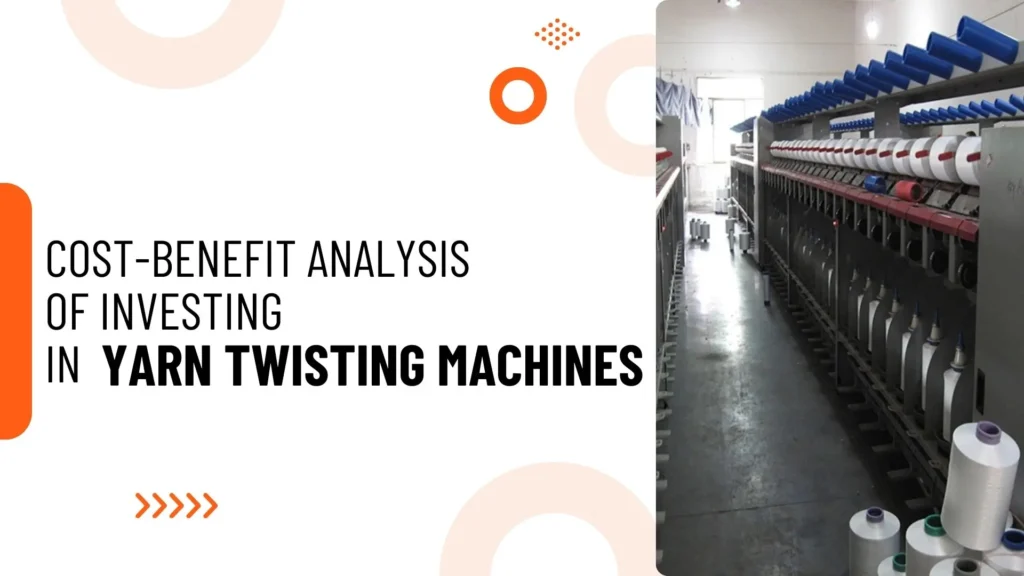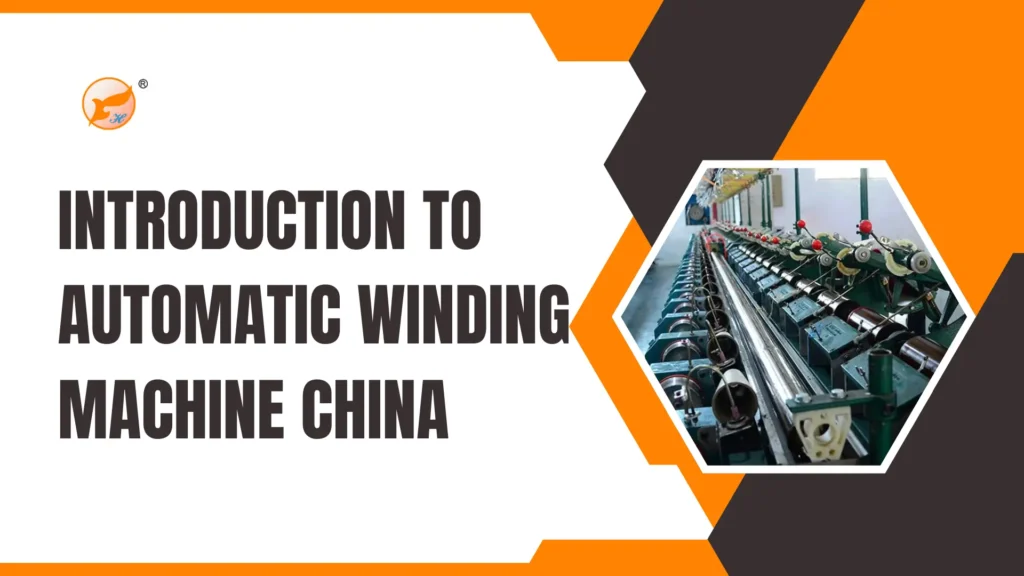Twisting machines for yarn are absolutely integral to yarns produced for textiles because they ensure compliance to industry strength and quality standards.
These are within the profile of specific sectors in the textile tradition, such as fashion, home textiles, and even technical textiles.
With the increasing demand for quality fabric by end users, the need for a reliable and efficient yarn twisting machine should never be overemphasized.
This machinery also enables manufacturers to produce consistent high quality yarn that meets the needs of a mixed market.
It is imperative for any prospective buyer to understand the economics behind any purchase of new yarn twisting machines in order to fully appreciate the cost versus the benefits incurred from such investments.
This economic analysis would aid the business in judging whether or not to choose a given option.
For example, by weighing initial costs against long-term benefits associated with such acquisition, it would help a firm make what is referred to as an appropriate decision aligned with its goals and ability to cater to its financial needs.
Initial Investment Costs

Price of Machine Purchase
The purchase price of yarn twisting machines varies from machine to machine on several fronts-the most important among these being brand, features, and production capacity.
As usual, machines offering state-of-the-art technology with complete automation will be expensive.
On the other hand, these machines are more efficient and reliable as compared to their low-end counterparts.
Proper analysis of production requirements and budget would help companies choose machines wisely as per their needs.
Installation and Setup Price
Other than purchase price, the installation and setup cost of the machine also be factored in.
A proper installation will ensure that the machine runs smoothly and does not disrupt from the beginning.
Setup cost may include the involvement of technicians, modification of the existing structure, and all the safety standards that were to be ensured.
A well-installed machine minimizes interference in production processes and maximizes productivity.
Additional Equipment Acquisition
An investment in yarn twisting machines may also require extra devices such as spools, bobbins, safety devices, etc.
These devices are very critical for the smooth running of the machine, and thus need to be added to the overall budget.
Companies could be required to acquire software or control systems to couple their yarn twisting machine for optimal workings as well.
Ongoing Operational Costs
Expenses on Maintenance and Repair
Regular maintenance plays a vital role in the longevity and efficiency of all yarn twisting machines.
Maintenance and repair budgets must be put aside for routine maintenance and unexpected repairs in order to avert costlier downtimes.
Scheduled maintenance not only increases the life span of the machines but ensures that the machines operate at peak performance for better-quality output with minimal production delays.
Energy Costs

Yarn twisting machines draw electricity, an important cost in the operation of the factory.
Energy consumption amounts for a yarn twisting machine vary from model to model with respect to size and technology used.
Being in the category of energy saving machines may indeed save costs in the long run due to less consumption of power at quite a performance level.
Additionally, some energy-efficient machines usually have their associated features used in waste reduction and maximum operational overall efficiency.
Labor Expenses
Machines may shorten production processes, but sufficient proper training of skilled, qualified operators is still necessary to supervise operations.
Suppose you could budget for yarn twisting machines.
In that case, you would include the costs associated with training their employees to operate efficient trained skilled laborers using less error resulting in higher production.
The amount of errors during production process may lessen and increase production due to technical prowess associated with using the maximum potential of a machine.
Benefits of Yarn Twisting Machines
Higher Production Efficiency
The yarn twisting machines are designed to work at very high speeds, thereby increasing productivity considerably.
Such efficiency allows meeting the customers’ purchase requests, not compromising much on quality.
By automating the twisting process, manufacturers will thereby cut down the time required to produce yarn and will be able to fill orders more quickly and efficiently.
Quality Improvement of Products
This machine provides consistent tension and twist in yarn that ultimately results in superior quality yarn.
The quality of yarn is crucial to fabric production according to standards and what is sought after by customers.
Reducing variation in production of yarn will, in turn, minimize defects in the final product, thus increasing customer satisfaction and reducing returns.
Long-term Cost Benefits

While there is a high initial investment in yarn twisting machines, the long-term savings made through increased productivity and reduced waste make the investment worthwhile.
Businesses can expect favorable returns on investment (ROI) because there will be lower operational costs over time due to the improvements in efficiency.
In addition, such high-quality yarns can sell at a really high price in the market, thus adding further to the profits.
And More:
- Yarn Twisting Machine Automation: Benefits and Challenges
- Role of Yarn Twisting Machines in Reducing Waste in Textile Production
Competitive Advantages
Staying Ahead in the Market
Investing in advanced technology yarn twisting helps businesses to maintain a pace with industry trends and consumer demands.
As the textile market becomes more cut-throat, having the most advanced machinery can differentiate a company from its competitors.
This gives manufacturers the opportunity to benefit from quickly changing customer preferences and prevailing market conditions and keep them updated.
Expanding Product Lines
With high-quality yarn produced by those machines, businesses can go beyond just one kind of product into ratified products.
Such product diversity enables companies to target different customers or markets.
With new products, businesses will be able to create or attract new customers, increase sales, and develop their market presence.
Supporting Sustainability Goals
Many modern yarn twisting machines have been designed to be energy-efficient so that businesses can cut down on the carbon footprint.
Such a commitment will go a long way toward enhancing the brand image, besides creating a niche for the company among the environmentally conscious end-users.
In this respect, the eco-friendly technologies will help align companies to global trends of sustainability, which have been very appealing to segments of customers that buy based on
 environmentally responsible consumption.
environmentally responsible consumption.
Factors to Consider Before Investing
Market Research
Market research is pertinent before any investments because businesses have to be aware of contemporary trends and consumer preferences.
In fact, market demand and competitive landscape are the bases on which a business makes informed purchase decisions.
Customers’ needs are valuable insights that help businesses in determining the right machines and features that best complement their overall strategic objectives.
Financial Planning and Budgeting
It must go hand in hand with drafting a comprehensive financial plan.
It should analyze the financial status of the business and forecast future revenue to see if the investment is viable.
A budget that is well-organized will certainly help companies in allocating resources effectively for both initial and ongoing costs concerning the use of the machinery.
Keeping Up with Technological Advances
Being updated with technological evolutions in yarn twisting equipment enables the procurement of machines suitable for business operational purposes.
It reduces costs, improves efficiency, and increases productivity through investing in the latest technology.
Making periodic updates to machinery again keeps businesses competitive in a fast-changing marketplace.

Conclusion
This is indeed a wise decision for any textile business. A decision can never make sense without evaluating the risks and gains.
It will include all components of ROI calculations, which will describe the clear picture of how far the costs pay against benefits.
Considering all those, one may take an excellent decision for future direction.
How speedier and less the operations will cost will increase the definition of future growth and how advanced the product will be to push the business to excel in the competitive segment.
A one-time investment will be good for the extensive future.
Yarn twisting machines are definitely one of the important investments in quality and efficiency.
Those businesses that visualize such potential will find themselves at the top in a dynamic and evolving textile industry.
It is what sustainability will be all about: growth in future profit, eventually leading to an even more attractive market presence and improved customer satisfaction.


